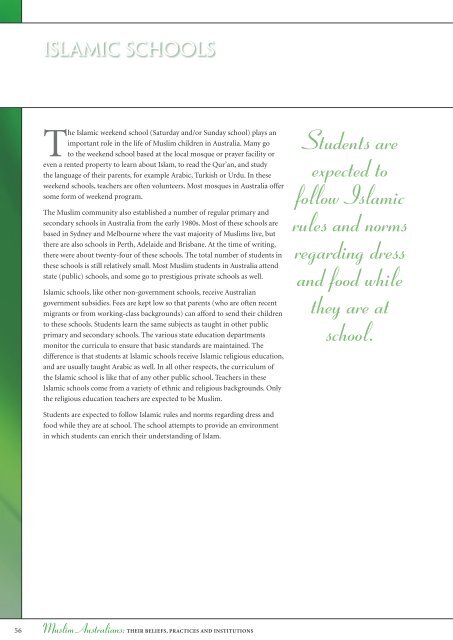Muslim Australians - Religion Cultural Diversity Resource Manual
http://www.islamicglobe.com
http://www.islamicglobe.com
Create successful ePaper yourself
Turn your PDF publications into a flip-book with our unique Google optimized e-Paper software.
ISLAMIC SCHOOLS<br />
The Islamic weekend school (Saturday and/or Sunday school) plays an<br />
important role in the life of <strong>Muslim</strong> children in Australia. Many go<br />
to the weekend school based at the local mosque or prayer facility or<br />
even a rented property to learn about Islam, to read the Qur’an, and study<br />
the language of their parents, for example Arabic, Turkish or Urdu. In these<br />
weekend schools, teachers are often volunteers. Most mosques in Australia offer<br />
some form of weekend program.<br />
The <strong>Muslim</strong> community also established a number of regular primary and<br />
secondary schools in Australia from the early 1980s. Most of these schools are<br />
based in Sydney and Melbourne where the vast majority of <strong>Muslim</strong>s live, but<br />
there are also schools in Perth, Adelaide and Brisbane. At the time of writing,<br />
there were about twenty-four of these schools. The total number of students in<br />
these schools is still relatively small. Most <strong>Muslim</strong> students in Australia attend<br />
state (public) schools, and some go to prestigious private schools as well.<br />
Islamic schools, like other non-government schools, receive Australian<br />
government subsidies. Fees are kept low so that parents (who are often recent<br />
migrants or from working-class backgrounds) can afford to send their children<br />
to these schools. Students learn the same subjects as taught in other public<br />
primary and secondary schools. The various state education departments<br />
monitor the curricula to ensure that basic standards are maintained. The<br />
difference is that students at Islamic schools receive Islamic religious education,<br />
and are usually taught Arabic as well. In all other respects, the curriculum of<br />
the Islamic school is like that of any other public school. Teachers in these<br />
Islamic schools come from a variety of ethnic and religious backgrounds. Only<br />
the religious education teachers are expected to be <strong>Muslim</strong>.<br />
Students are<br />
expected to<br />
follow Islamic<br />
rules and norms<br />
regarding dress<br />
and food while<br />
they are at<br />
school.<br />
Students are expected to follow Islamic rules and norms regarding dress and<br />
food while they are at school. The school attempts to provide an environment<br />
in which students can enrich their understanding of Islam.<br />
56 <strong>Muslim</strong> <strong>Australians</strong>:THEIR BELIEFS, PRACTICES AND INSTITUTIONS














